Tōhoku Main Line
The Tōhoku Main Line (東北本線, Tōhoku-honsen) is a 575.7 km long railway line in Japan operated by the East Japan Railway Company (JR East). Although officially the line starts from Tokyo Station in Chiyoda, Tokyo, most of the long-distance trains actually begin at Ueno Station in Taitō, Tokyo, and pass through such cities as Saitama, Utsunomiya, Fukushima, and Sendai, before reaching the end of the line in Morioka. The line originally extended to Aomori, but was truncated upon the extension of the Tōhoku Shinkansen beyond Morioka, which mostly parallels the Tōhoku Main Line.
| Tōhoku Main Line | |||
|---|---|---|---|
 An E721 series EMU pulling into Nagamachi Station | |||
| Overview | |||
| Native name | 東北本線 | ||
| Owner | |||
| Locale | Kantō, Tōhoku | ||
| Termini | Tokyo Morioka | ||
| Technical | |||
| Line length | 575.7 km (357.7 mi) | ||
| Track gauge | 1,067 mm (3 ft 6 in) | ||
| Electrification | 1,500 V DC from Tokyo to Kuroiso 20 kV AC, 50 Hz from Kuroiso to Morioka | ||
| Operating speed | 120 km/h (75 mph) | ||
| |||
Tōhoku Main Line | |||||||||||||||||||||||||||||||||||||||||||||||||||||||||||||||||||||||||||||||||||||||||||||||||||||||||||||||||||||||||||||||||||||||||||||||||||||||||||||||||||||||||||||||||||||||||||||||||||||||||||||||||||||||||||||||||||||||||||||||||||||||||||||||||||||||||||||||||||||||||||||||||||||||||||||||||||||||||||||||||||||||||||||||||||||||||||||||||||||||||||||||||||||||||||||||||||||||||||||||||||||||||||||||||||||||||||||||||||||||||||||||||||||||||||||||||||||||||||||||||||||||||||||||||||||||||||||||||||||||||||||||||||||||||||||||||||||||||||||||||||||||||||||||||||||||||||||||||||||||||||||||||||||||||||||||||||||||||||||||||||||||||||||||||||||||||||||||||||||||||||||||||||||||||||||||||||||||||||||||||||||||||||||||||||||||||||||||||||||||||||||||||||||||||||||||||||||||||||||||||||||||||||||||||||||||||||||||||||||||||||||||||||||||||||||||||||||||||||||||||||||||||||||||||||||||||||||||||||||||||||||||||||||||||||||||||||||||||||||||||||||||||||||||||||||||||||||||||||||||
|---|---|---|---|---|---|---|---|---|---|---|---|---|---|---|---|---|---|---|---|---|---|---|---|---|---|---|---|---|---|---|---|---|---|---|---|---|---|---|---|---|---|---|---|---|---|---|---|---|---|---|---|---|---|---|---|---|---|---|---|---|---|---|---|---|---|---|---|---|---|---|---|---|---|---|---|---|---|---|---|---|---|---|---|---|---|---|---|---|---|---|---|---|---|---|---|---|---|---|---|---|---|---|---|---|---|---|---|---|---|---|---|---|---|---|---|---|---|---|---|---|---|---|---|---|---|---|---|---|---|---|---|---|---|---|---|---|---|---|---|---|---|---|---|---|---|---|---|---|---|---|---|---|---|---|---|---|---|---|---|---|---|---|---|---|---|---|---|---|---|---|---|---|---|---|---|---|---|---|---|---|---|---|---|---|---|---|---|---|---|---|---|---|---|---|---|---|---|---|---|---|---|---|---|---|---|---|---|---|---|---|---|---|---|---|---|---|---|---|---|---|---|---|---|---|---|---|---|---|---|---|---|---|---|---|---|---|---|---|---|---|---|---|---|---|---|---|---|---|---|---|---|---|---|---|---|---|---|---|---|---|---|---|---|---|---|---|---|---|---|---|---|---|---|---|---|---|---|---|---|---|---|---|---|---|---|---|---|---|---|---|---|---|---|---|---|---|---|---|---|---|---|---|---|---|---|---|---|---|---|---|---|---|---|---|---|---|---|---|---|---|---|---|---|---|---|---|---|---|---|---|---|---|---|---|---|---|---|---|---|---|---|---|---|---|---|---|---|---|---|---|---|---|---|---|---|---|---|---|---|---|---|---|---|---|---|---|---|---|---|---|---|---|---|---|---|---|---|---|---|---|---|---|---|---|---|---|---|---|---|---|---|---|---|---|---|---|---|---|---|---|---|---|---|---|---|---|---|---|---|---|---|---|---|---|---|---|---|---|---|---|---|---|---|---|---|---|---|---|---|---|---|---|---|---|---|---|---|---|---|---|---|---|---|---|---|---|---|---|---|---|---|---|---|---|---|---|---|---|---|---|---|---|---|---|---|---|---|---|---|---|---|---|---|---|---|---|---|---|---|---|---|---|---|---|---|---|---|---|---|---|---|---|---|---|---|---|---|---|---|---|---|---|---|---|---|---|---|---|---|---|---|---|---|---|---|---|---|---|---|---|---|---|---|---|---|---|---|---|---|---|---|---|---|---|---|---|---|---|---|---|---|---|---|---|---|---|---|---|---|---|---|---|---|---|---|---|---|---|---|---|---|---|---|---|---|---|---|---|---|---|---|---|---|---|---|---|---|---|---|---|---|---|---|---|---|---|---|---|---|---|---|---|---|---|---|---|---|---|---|---|---|---|---|---|---|---|---|---|---|---|---|---|---|---|---|---|---|---|---|---|---|---|---|---|---|---|---|---|---|---|---|---|---|---|---|---|---|---|---|---|---|---|---|---|---|---|---|---|---|---|---|---|---|---|---|---|---|---|---|---|---|---|---|---|---|---|---|---|---|---|---|---|---|---|---|---|---|---|---|---|---|---|---|---|---|---|---|---|---|---|---|---|---|---|---|---|---|---|---|---|---|---|---|---|---|---|---|---|---|---|---|---|---|---|---|---|---|---|---|---|---|---|---|---|---|---|---|---|---|---|---|---|---|---|---|---|---|---|---|---|---|---|---|---|---|---|---|---|---|---|---|---|---|---|---|---|---|---|---|---|---|---|---|---|---|---|---|---|---|---|---|---|---|---|---|---|---|---|---|---|---|---|---|---|---|---|---|---|---|---|---|---|---|---|---|---|---|---|---|---|---|---|---|---|---|---|---|---|---|---|---|---|---|---|---|---|---|---|---|---|---|---|---|---|---|---|---|---|---|---|---|---|---|---|---|---|---|---|---|---|---|---|---|---|---|---|---|---|---|---|---|---|---|---|---|---|---|---|---|---|---|---|---|---|---|---|---|---|---|---|---|---|---|---|---|---|---|---|---|---|---|---|---|---|---|---|---|---|---|---|---|---|---|---|---|---|---|---|---|---|---|---|---|---|---|---|---|---|---|---|---|---|---|---|---|---|---|---|---|---|---|---|---|---|---|---|---|---|---|---|---|---|---|---|---|---|---|---|---|---|---|---|---|---|---|---|---|---|---|---|---|---|---|---|---|---|---|---|---|---|---|---|---|---|---|---|---|---|---|---|---|---|---|---|---|---|---|---|---|---|---|---|---|---|---|---|---|---|---|---|---|---|---|---|---|---|---|---|---|
| |||||||||||||||||||||||||||||||||||||||||||||||||||||||||||||||||||||||||||||||||||||||||||||||||||||||||||||||||||||||||||||||||||||||||||||||||||||||||||||||||||||||||||||||||||||||||||||||||||||||||||||||||||||||||||||||||||||||||||||||||||||||||||||||||||||||||||||||||||||||||||||||||||||||||||||||||||||||||||||||||||||||||||||||||||||||||||||||||||||||||||||||||||||||||||||||||||||||||||||||||||||||||||||||||||||||||||||||||||||||||||||||||||||||||||||||||||||||||||||||||||||||||||||||||||||||||||||||||||||||||||||||||||||||||||||||||||||||||||||||||||||||||||||||||||||||||||||||||||||||||||||||||||||||||||||||||||||||||||||||||||||||||||||||||||||||||||||||||||||||||||||||||||||||||||||||||||||||||||||||||||||||||||||||||||||||||||||||||||||||||||||||||||||||||||||||||||||||||||||||||||||||||||||||||||||||||||||||||||||||||||||||||||||||||||||||||||||||||||||||||||||||||||||||||||||||||||||||||||||||||||||||||||||||||||||||||||||||||||||||||||||||||||||||||||||||||||||||||||||||
The 159.9 km long portion of the line between Ueno Station and Kuroiso Station in Nasushiobara, Tochigi is often referred to as the (JR) Utsunomiya Line. A portion of the Tōhoku Main Line is also shared with the Keihin-Tōhoku Line (29.6 km between Tokyo Station and Ōmiya Station in Ōmiya-ku, Saitama) and the Saikyō Line (18.0 km between Akabane Station in the Kita ward of Tokyo and Ōmiya Station).
Station list
These lists are separated by service patterns provided on the Tōhoku Main Line.
Kuroiso – Shin-Shirakawa
| Station | Japanese | Distance (km) (from Tokyo) |
Transfers | Location | |
|---|---|---|---|---|---|
| Kuroiso | 黒磯 | 163.3 | ■ Utsunomiya Line | Nasushiobara | Tochigi Prefecture |
| Takaku | 高久 | 167.3 | Nasu | ||
| Kurodahara | 黒田原 | 171.5 | |||
| Toyohara | 豊原 | 176.7 | |||
| Shirasaka | 白坂 | 182.0 | Shirakawa | Fukushima Prefecture | |
| Shin-Shirakawa | 新白河 | 185.4 | Nishigo | ||
Shin-Shirakawa – Fukushima
| Station | Japanese | Distance (km) (from Tokyo) |
Transfers | Location | |
|---|---|---|---|---|---|
| Shin-Shirakawa | 新白河 | 185.4 | Nishigo | Fukushima Prefecture | |
| Shirakawa | 白河 | 188.2 | Shirakawa | ||
| Kutano | 久田野 | 192.9 | |||
| Izumizaki | 泉崎 | 197.4 | Izumizaki | ||
| Yabuki | 矢吹 | 203.4 | Yabuki | ||
| Kagamiishi | 鏡石 | 208.8 | Kagamiishi | ||
| Sukagawa | 須賀川 | 215.1 | Sukagawa | ||
| Asaka-Nagamori | 安積永盛 | 221.8 | ■ Suigun Line | Kōriyama | |
| Kōriyama | 郡山 | 226.7 |
| ||
| Hiwada | 日和田 | 232.4 | |||
| Gohyakugawa | 五百川 | 236.9 | Motomiya | ||
| Motomiya | 本宮 | 240.7 | |||
| Sugita | 杉田 | 246.6 | Nihonmatsu | ||
| Nihonmatsu | 二本松 | 250.3 | |||
| Adachi | 安達 | 254.5 | |||
| Matsukawa | 松川 | 259.5 | Fukushima | ||
| Kanayagawa | 金谷川 | 264.0 | |||
| Minami-Fukushima | 南福島 | 269.4 | |||
| Fukushima | 福島 | 272.8 |
| ||
Fukushima – Sendai
- ●: All rapid trains stop
- |: All rapid trains pass
Sendai – Kogota
| Station | Japanese | Distance (km) (from Tokyo) |
Transfers | Location | |
|---|---|---|---|---|---|
| Sendai | 仙台 | 351.8 |
|
Aoba-ku, Sendai | Miyagi Prefecture |
| Higashi-Sendai | 東仙台 | 355.8 | Miyagino-ku, Sendai | ||
| Iwakiri | 岩切 | 359.9 | |||
| Shin-Rifu | 新利府 | 2.5 (from Iwakiri) | Branch line from Iwakiri | Rifu | |
| Rifu | 利府 | 4.2 (from Iwakiri) | |||
| Rikuzen-Sannō | 陸前山王 | 362.2 | Tagajō, Miyagi | ||
| Kokufu-Tagajō | 国府多賀城 | 363.5 | |||
| Shiogama | 塩釜 | 365.2 | ■ Senseki-Tōhoku Line | Shiogama | |
| Matsushima | 松島 | 375.2 | Matsushima | ||
| Atago | 愛宕 | 377.2 | |||
| Shinainuma | 品井沼 | 381.6 | |||
| Kashimadai | 鹿島台 | 386.6 | Ōsaki | ||
| Matsuyama-Machi | 松山町 | 391.5 | |||
| Kogota | 小牛田 | 395.0 | Misato | ||
Kogota – Ichinoseki
| Station | Japanese | Distance (km) (from Tokyo) |
Transfers | Location | |
|---|---|---|---|---|---|
| Kogota | 小牛田 | 395.0 | Misato | Miyagi Prefecture | |
| Tajiri | 田尻 | 401.1 | Ōsaki | ||
| Semine | 瀬峰 | 407.8 | Kurihara | ||
| Umegasawa | 梅ヶ沢 | 411.5 | Tome | ||
| Nitta | 新田 | 416.2 | |||
| Ishikoshi | 石越 | 423.5 | |||
| Yushima | 油島 | 427.0 | Ichinoseki | Iwate Prefecture | |
| Hanaizumi | 花泉 | 431.2 | |||
| Shimizuhara | 清水原 | 434.4 | |||
| Arikabe | 有壁 | 437.8 | Kurihara | Miyagi Prefecture | |
| Ichinoseki | 一ノ関 | 445.1 | Ichinoseki | Iwate Prefecture | |
Ichinoseki – Morioka
- A: Aterui
- H: Hamayuri
- ●: All rapid trains stop
- |: All rapid trains pass
| Station | Japanese | Distance (km) (from Tokyo) |
Rapid | Transfers | Location | ||
|---|---|---|---|---|---|---|---|
| A | H | ||||||
| Ichinoseki | 一ノ関 | 445.1 | Ichinoseki | Iwate Prefecture | |||
| Yamanome | 山ノ目 | 448.0 | |||||
| Hiraizumi | 平泉 | 452.3 | Hiraizumi | ||||
| Maesawa | 前沢 | 459.9 | Ōshū | ||||
| Rikuchū-Orii | 陸中折居 | 465.1 | |||||
| Mizusawa | 水沢 | 470.1 | ● | ||||
| Kanegasaki | 金ヶ崎 | 477.7 | ● | Kanegasaki | |||
| Rokuhara | 六原 | 481.1 | ● | ||||
| Kitakami | 北上 | 487.5 | ● | Kitakami | |||
| Murasakino | 村崎野 | 492.2 | ↓ | ||||
| Hanamaki | 花巻 | 500.0 | ● | ● | ■ Kamaishi Line | Hanamaki | |
| Hanamaki-Kūkō | 花巻空港 | 505.7 | ↓ | | | |||
| Ishidoriya | 石鳥谷 | 511.4 | ↓ | | | |||
| Hizume | 日詰 | 516.8 | ↓ | | | Shiwa | ||
| Shiwachūō | 紫波中央 | 518.6 | ↓ | | | |||
| Furudate | 古館 | 521.5 | ↓ | | | |||
| Yahaba | 矢幅 | 525.1 | ● | ● | Yahaba | ||
| Iwate-Iioka | 岩手飯岡 | 529.6 | ↓ | | | Morioka | ||
| Senbokuchō | 仙北町 | 533.5 | ● | | | |||
| Morioka | 盛岡 | 535.3 | ● | ● |
| ||
Rolling stock
Ueno – Kuroiso
- E231 series EMUs
- E233-3000 series EMUs
- 205-600 series EMUs (Between Utsunomiya and Kuroiso)
From March 2013, a fleet of eight refurbished 4-car 205 series EMUs was phased in on Utsunomiya Line services between Koganei and Kuroiso, replacing 211 series sets.[1]
 An E231-1000 series EMU
An E231-1000 series EMU An E233-3000 series EMU
An E233-3000 series EMU A 205-600 series EMU
A 205-600 series EMU
Kuroiso – Shin-Shirakawa
Shin-Shirakawa – Ichinoseki
- 701 series EMUs
- 719 series EMUs
- E721 series/ SAT721 series EMUs
- HB-E210 series DMUs - Senseki-Tohoku Line
Ichinoseki – Morioka
- 701 series EMUs
 701 series (Sendai-based)
701 series (Sendai-based)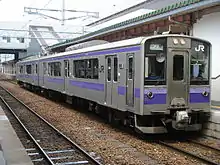 701 series (Morioka-based)
701 series (Morioka-based) 719 series
719 series E721 series (right) and SAT721 series (left)
E721 series (right) and SAT721 series (left)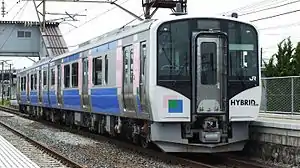 HB-E210 series hybrid DMU
HB-E210 series hybrid DMU
History
The construction of the Tōhoku Main Line began in the Kantō region and extended to the north end of Honshu, and the city of Aomori. It is one of oldest railway lines in Japan, with construction beginning in the late 19th century. Until November 1, 1906, the current Tōhoku Main Line was run by a private company Nippon Railway.
In 1883, the first segment between Ueno and Kumagaya opened. In 1885, it was extended to Utsunomiya, but the Tone River had to be crossed by boat. Following construction of the Tone River Bridge in 1886, Utsunomiya and Ueno were directly connected. The line gradually extended further to the north; to Kōriyama, Sendai, Ichinoseki and Morioka. In 1891, the segment between Morioka and Aomori opened, creating the longest continuous railway line in Japan.
After 1906, the line was nationalized and became the Tohoku Main Line operated by the Ministry of Railways. When Tokyo Station opened in 1925, the Tōhoku Main Line was extended from Ueno to the new station. Until the 1950s, this segment was used and many trains ran through both the Tōkaidō Main Line and Tohoku Main Line. However, when the Tohoku Shinkansen opened, it occupied land previously used for the tracks of mid and long-distance Tohoku Main Line trains. As a result, only a small number of commuter lines such as the Keihin-Tohoku Line now operate to Tokyo from the north, making Tokyo Station's status as part of the Tōhoku Main Line somewhat circumspect. This is set to change in March 2015 when the under-construction Ueno-Tokyo Line is completed, facilitating through service between the Tōkaidō Line and the Utsunomiya and Joban Lines.
In 2002, the Tohoku Shinkansen was extended from Morioka to Hachinohe and the operations of the local track segment between those two cities was turned over to Iwate Ginga Railway (IGR) and Aoimori Railway.[2] With the extension of the Tōhoku Shinkansen to Shin-Aomori station in 2010, the segment between Hachinohe and Aomori was delegated to the Aoimori Railway Company. The shortened Tōhoku Main Line is now the second-longest line in Japan, after the Sanin Main Line.
Double-tracking
The Tokyo to Omiya section was double-tracked between 1892 and 1896, extended to Furukawa in 1908, Koyama the following year, and to Utsunomiya in 1913.
The Iwanuma - Sendai - Iwakiri section was double-tracked between 1920 & 1923 and the Utsunomiya - Iwanuma section between 1959 and 1964. The Iwakiri - Morioka - Aomori section was double-tracked between 1951 and 1968, including the 17 km realigned section between Iwakiri and Atago in 1962.
Electrification
The 7 km Tokyo to Tabata section was electrified at 1,500 V DC in 1909, extended to Akabane in 1928, Omiya in 1932 and Kuroiso in 1959. Electrification was then continued north at 20 kV AC, reaching Fukushima in 1960, Sendai in 1961, Morioka in 1965, and Aomori in 1968.
Former connecting lines
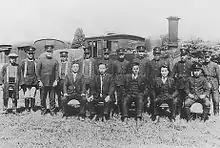
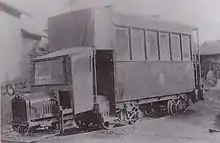


Saitama Prefecture
- Hasuda Station: The Bushu Railway operated a 17 km line to Kamine from 1924 until 1938.
Tochigi Prefecture
- Mamada Station: A 2 km 610 mm (2 ft) gauge handcar line to Omoigawa operated between 1899 and 1917.
- Hoshakuji Station: A 12 km line servicing the Utsunomiya Army Airfield operated between 1942 and 1945.
- Ujiie Station: An 8 km 610 mm (2 ft) gauge handcar line operated to Kitsuregawa between 1902 and 1918.
- Yaita Station: The Tobu Railway opened the 24 km 762 mm (2 ft 6 in) gauge Tobu Yaita Line to Shin Takatoku (on the Tobu Kinugawa Line) on 1 March 1924.[3] The line was converted to 1,067 mm (3 ft 6 in) gauge in 1929, and closed on 30 June 1959.[3]
- Nishi-Nasuno Station: A 15 km line was opened by the Shiobara Railway to Shiobara in 1912. The line was electrified at 550 V DC in 1921, and closed in 1936. The Higashino Railway opened a 24 km line to Nasu Ogawa between 1918 and 1924, the line closing in 1968. At Otawara Station, it connected with the 762 mm (2 ft 6 in) horse-drawn tramway mentioned below for the three years they were both open. A 5 km 762 mm gauge handcar line to Otawara opened in 1908. In 1917, it was converted to a horse-drawn tramway, but closed in 1921. At Otawara Station, it connected with the Higashino Railway line mentioned above.
Fukushima Prefecture
- Shirakawa Station: A 23 km line to Iwaki Tanakura (on the Suigun Line) was opened by the Shirotana Railway in 1916. The line was nationalised in 1941, and closed in 1944. Plans to reopen the line in 1953 resulted in a decision to convert the line to a dedicated busway, which opened in 1957.
- Koriyama Station: The Fukushima Prefectural Government operated a 13 km 762 mm (2 ft 6 in) gauge line to Miharu between 1891 and 1914.
- Matsukawa Station: A 12 km line to Iwashiro Kawamata operated from 1926 until 1972.
Miyagi Prefecture
- The Miyagi Prefectural Government operated the following three lines, all utilising 762 mm (2 ft 6 in) gauge track:
- Ogawara Station: a 27 km line to Toogatta opened between 1917 and 1922, and closed in 1937.
- Tsukinoki Station: a 19 km line to Tateyama, opened in 1899 as a horse-drawn tramway. Steam locomotion was introduced in 1917, and the line closed in 1929.
- Natori Station: a 6 km line to Yurage, operated from 1926 until 1939.
- Nagamachi Station: A 16 km 762 mm (2 ft 6 in) gauge horse-drawn tramway was opened to Akiu Onsen in 1912. In 1925, the Akiho Electric Railway converted the line to 1,067 mm (3 ft 6 in) gauge and electrified it at 600 V DC. The line closed in 1961.
- Kofuku-Tagajo Station: When the Tohoku Main Line was realigned in 1956, the original line to Shiogama Wharf (on the Senseki Line) remained in place as a freight-only line, closing in 1997.
- Matsushima Station: The Miyagi Prefectural Government operated a 4 km, 1,067 mm gauge line to Matsushima Kaigan, electrified at 550 V DC, between 1922 and 1944.
- Matsushima-Machi Station: A 2 km 610 mm (2 ft) gauge handcar line operated between 1923 and 1930.
- Kogota Station: Prior to the opening of the Rikuu East Line, a 10 km 2 ft 5 in (737 mm) gauge horse-drawn tramway operated to Furukawa between 1900 and 1913.
- Semine Station: The Senpoku Railway operated a 41 km 762 mm gauge line from Tome to Tsukidate between 1921 and 1968.
- Ishikoshi Station: The Kurihara Den'en Railway Line operated between 1921 and 2007.
Iwate Prefecture
- Hanamaki Station: An 18 km 762 mm gauge line to Nishinamari Onsen was opened in 1915 by the Hanamaki Electric Railway, which then opened a second line, 8 km to Hanamaki Onsen in 1925. Both lines were electrified at 600 V DC. The latter closed in 1972, and the former in 1976.
Aomori Prefecture
- Hachinohe Station: The Gonohe Electric Railway operated a 12 km line (not electrified, despite the company name) to Gonohe between 1929 and 1969.
- Misawa Station: The Towada Kanko Electric Railway Line operated between 1922 and 2012.
- Noheji Station: The Nanbu Jūkan Railway opened a 21 km line to Shichinohe in 1962. Freight services ceased in 1984, and the line closed in 1997.
See also
References
- 日光線、宇都宮線に205系リニューアル車投入 [Refurbished 205 series to be introduced on Nikko and Utunomiya Line]. Tetsudo Hobidas (in Japanese). Japan: Neko Publishing Co., Ltd. 27 September 2012. Retrieved 28 September 2012.
- Tetsudo Hobidas: "JR東日本 東北本線八戸―青森間の廃止を届出 " (27 November 2009). Retrieved 27 November 2009. (in Japanese)
- Hanai, Masahiro (April 1998). "東北本線沿線に失われた私鉄の接続駅を訪ねる1 東武鉄道矢板線" [Visiting Lost Private Railway Interchange Stations on the Tohoku Main Line (1): Tobu Yaita Line]. Japan Railfan Magazine. Vol. 38 no. 444. Japan: Kōyūsha Co., Ltd. pp. 76–81.
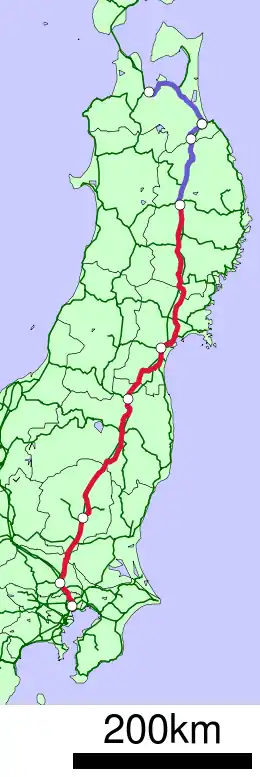
.svg.png.webp)